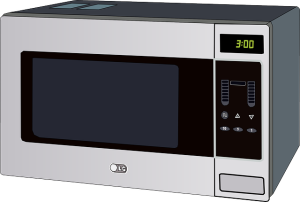microwave (oven) ![]()
[noun]
[de mag-ne-tron, de mag-ne-trons]
 If you think that “magnetron” is the Dutch translation of the name of a character from the X-men or Transformers series, you’re wrong… 🙂
If you think that “magnetron” is the Dutch translation of the name of a character from the X-men or Transformers series, you’re wrong… 🙂
The Netherlands are probably the only country in the world where the microwave oven is called by its main internal component that produces the microwave radiation: the cavity magnetron… Even in Belgium, the Dutch “magnetron” is called “microgolfoven” (i.e. the literal translation of microwave oven).
Sometimes you will see the word “combi-magnetron”, which means that the microwave also has an oven/grill function.
Examples:
– “Verwarm de saus drie minuten in de magnetron op 1000 Watt.”
(“Heat up the sauce for three minutes in the microwave at 1000 Watt.”)
– “Kunnen we die noedels van de afhaalchinees ook morgen nog in de magnetron stoppen?”
(“Can we put those noodles from the take-away Chinese in the microwave tomorrow?.”)
– “Frank heeft nooit zin om te koken en haalt altijd een magnetronmaaltijd van de supermarkt.”
(“Frank never feels like cooking and always gets a microwave dinner at the supermarket.”)
Related words:
– Opwarmen: to heat up [verb] [warmde op, opgewarmd].
– Vermogen: power [noun] [het vermogen, de vermogens].
Example:
– “Hoe lang moet deze maaltijd in de magnetron?” – “Vijf minuten op vol vermogen.”
(“How long does this dinner have to go in the microwave?” – “Five minutes at full power.)
– Koken: to cook [verb] [kookte, gekookt].




